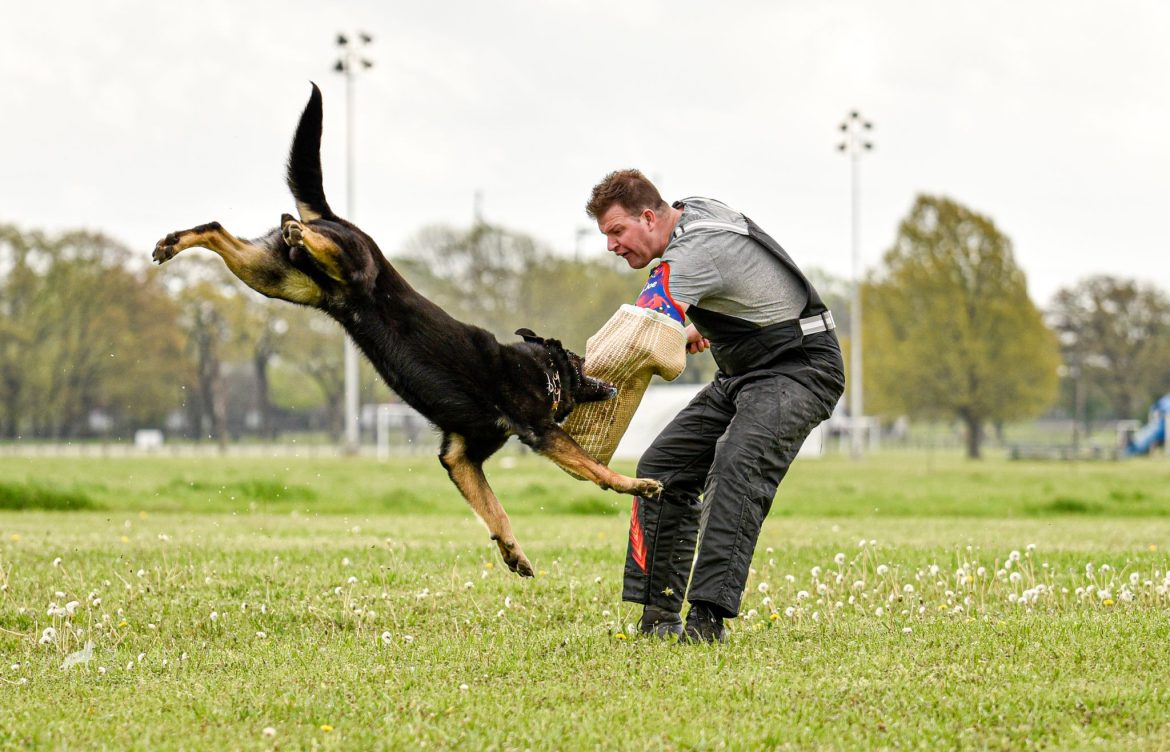The Value of Schutzhund Training for German Shepherd Dog Breeders
Time to Read: Approximately 9 minutes
Schutzhund, also known as IPO (Internationale Prüfungsordnung) or IGP (Internationale Gebrauchshunde Prüfungsordnung), is a rigorous and multi-faceted dog sport that tests a dog’s abilities in tracking, obedience, and protection. Originating in Germany over a century ago, Schutzhund was developed specifically for German Shepherds to assess their suitability as working dogs. For the German Shepherd dog breeder, particularly those specializing in GSDs, Schutzhund training holds immense value. It not only enhances the individual capabilities of each dog but also ensures the integrity and quality of the breed. This article explores the various aspects of Schutzhund training and its significance for German Shepherd dog breeders.
Historical Background of Schutzhund for German Shepherd Dog Breeders
Schutzhund training was developed in Germany in the early 1900s by Captain Max von Stephanitz, the founder of the German Shepherd breed. The primary purpose of Schutzhund was to evaluate the working capabilities of German Shepherds, ensuring they possessed the necessary traits for demanding jobs such as herding, police work, and military service. Schutzhund tests a dog’s tracking ability, obedience, and protection skills, providing a comprehensive assessment of their temperament, intelligence, and physical abilities. Over the years, Schutzhund has evolved into a formalized sport with standardized rules and competitions, attracting participants from around the world.
Assessing Temperament and Work Ethic
One of the primary values of Schutzhund training for German Shepherd breeders is its ability to assess temperament and work ethic accurately. German Shepherds are renowned for their loyalty, intelligence, and strong work drive, and Schutzhund provides a structured platform to evaluate these traits. The rigorous training process and comprehensive testing in tracking, obedience, and protection allow breeders to identify dogs that possess the ideal combination of focus, discipline, and resilience.
Tracking tests a dog’s scenting ability and concentration, requiring them to follow a specific scent trail accurately. Obedience evaluations assess a dog’s responsiveness to commands, attention to their handler, and overall behavior under various conditions. Protection tests evaluate a dog’s courage, control, and ability to protect their handler. Each of these components provides valuable insights into a dog’s temperament, ensuring that only those with the desired traits are selected for breeding.
Enhancing Physical and Mental Fitness
Schutzhund training enhances both the physical and mental fitness of German Shepherds. The demanding nature of the sport requires dogs to be in excellent physical condition, with strong muscles, endurance, and agility. Regular training sessions, which include tracking, obedience drills, and protection exercises, ensure that dogs remain fit and healthy. This physical conditioning is crucial for breeding as it ensures that the puppies inherit robust genetic traits that contribute to their overall health and athleticism.
Mental fitness is equally important in Schutzhund training. The sport challenges dogs to think critically, solve problems, and maintain focus under various conditions. The mental stimulation provided by Schutzhund training prevents boredom and promotes cognitive development. For breeders, this translates into well-rounded dogs that are not only physically capable but also mentally sharp and adaptable.
German Shepherd Dog Breeders Preserving Working Line Integrity
For the German Shepherd Dog breeder, maintaining the integrity of working lines is of paramount importance. Working line German Shepherds are bred for performance and functionality, with a strong emphasis on their abilities in various working roles. Schutzhund training plays a critical role in preserving the working line integrity by providing a standardized and objective measure of a dog’s working capabilities.
Breeders can use Schutzhund titles and achievements as benchmarks for selecting breeding pairs. Dogs that excel in Schutzhund competitions are more likely to produce offspring with the desired working traits. This selective breeding process ensures that the working line German Shepherds retain their exceptional qualities, making them suitable for roles in law enforcement, search and rescue, military service, and other demanding jobs.
Evaluating Genetic Health and Soundness
In addition to assessing temperament and work ethic, Schutzhund training indirectly evaluates genetic health and soundness. The rigorous physical demands of Schutzhund require dogs to be free of genetic disorders that could impair their performance. For example, conditions such as hip and elbow dysplasia, common in large breeds like German Shepherds, would prevent a dog from excelling in Schutzhund.
Responsible breeders incorporate health screenings, such as hip and elbow evaluations, into their breeding programs. By selecting dogs that not only succeed in Schutzhund but also pass genetic health tests, breeders can ensure the overall health and longevity of the breed. This focus on genetic soundness contributes to the quality and reputation of the breeding program.
Building Stronger Breeder-Owner Relationships
Schutzhund training fosters stronger relationships between breeders and puppy owners. Many breeders actively participate in Schutzhund training and competitions, providing valuable mentorship and support to puppy buyers interested in pursuing the sport. This shared interest creates a sense of community and collaboration, benefiting both breeders and owners.
Breeders can guide puppy owners through the initial stages of training, offer advice on best practices, and connect them with experienced trainers and clubs. For puppy owners, this support enhances their training experience and builds trust and loyalty with the breeder. The result is a network of dedicated individuals working together to promote the breed’s excellence and improve their dogs’ lives.
Promoting Ethical Breeding Practices
Schutzhund training promotes ethical breeding practices by encouraging breeders to prioritize quality over quantity. The time, effort, and resources required to train and compete in Schutzhund mean that breeders focus on producing a limited number of high-quality dogs rather than large quantities of puppies. This emphasis on quality ensures that each dog receives the necessary attention and care to reach its full potential.
Ethical breeders are committed to preserving the breed’s integrity and improving its overall quality. Schutzhund training aligns with this commitment by providing a framework for selecting breeding pairs based on objective performance criteria. Breeders who engage in Schutzhund demonstrate their dedication to producing an exceptional German Shepherd Dog puppy and contributing positively to the breed’s future.
Enhancing Public Perception and Breed Reputation
German Shepherds participating in Schutzhund competitions showcase the breed’s versatility, intelligence, and working capabilities. The public often associates German Shepherds with excellence in various roles, from service dogs to competitive athletes. Schutzhund competitions highlight these qualities, enhancing the breed’s reputation and promoting positive public perception.
For breeders, having dogs that excel in Schutzhund can be a valuable marketing tool. Puppies from proven Schutzhund lines are often in high demand, attracting prospective buyers who value the breed’s working abilities. This positive reputation benefits the breeding program and the breed, encouraging responsible ownership and promoting the German Shepherd’s contributions to society.
Encouraging Responsible Ownership
Schutzhund training encourages responsible ownership by promoting structured training, socialization, and care. Owners involved in Schutzhund are committed to providing their dogs with physical and mental stimulation, regular exercise, and proper training. This commitment translates into well-behaved, well-adjusted dogs that are a credit to the breed.
Responsible ownership is essential for maintaining the breed’s reputation and ensuring the welfare of individual dogs. By fostering a culture of responsible ownership, Schutzhund training benefits breeders, owners, and the broader community. Dogs that receive proper training and care are less likely to develop behavioral issues, enhancing their quality of life and strengthening the bond between owners and their pets.
Challenges and Commitment of Schutzhund Training
While Schutzhund training offers numerous benefits, it also requires a significant commitment from both breeders and owners. The training process is time-consuming, demanding, and often requires specialized knowledge and resources. Breeders must be prepared to invest in high-quality training, health screenings, and competitions.
Owners interested in Schutzhund must be willing to dedicate time and effort to training their dogs regularly. This commitment includes attending training sessions, participating in competitions, and maintaining the dog’s physical and mental fitness. The rewards of Schutzhund training are well worth the effort, but it requires dedication and perseverance.
Conclusion
Schutzhund training holds immense value for German Shepherd dog breeders, offering a comprehensive assessment of a dog’s temperament, work ethic, and physical capabilities. By participating in Schutzhund, breeders can ensure the integrity and quality of their breeding programs, preserve working line traits, and promote ethical breeding practices. Schutzhund training also enhances the breed’s reputation, fosters responsible ownership, and strengthens the bond between breeders and puppy owners. While the training process requires significant commitment, the rewards include producing exceptional German Shepherds that excel in various roles and contribute positively to society. For German Shepherd dog breeders, Schutzhund training is an invaluable tool for preserving and enhancing the breed’s legacy.




